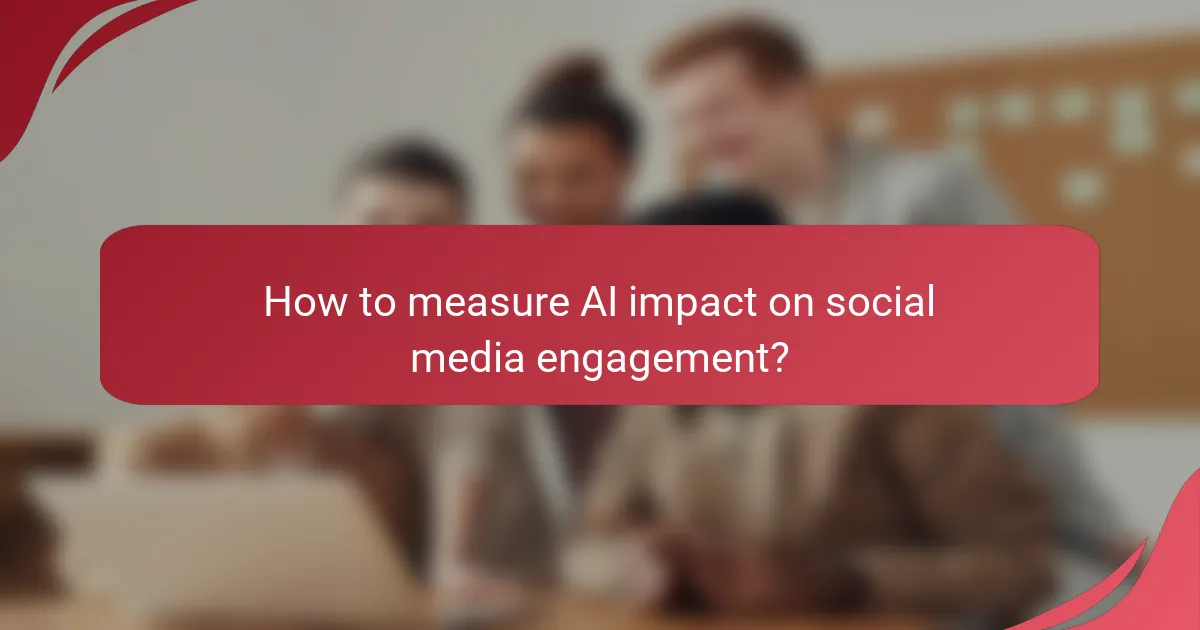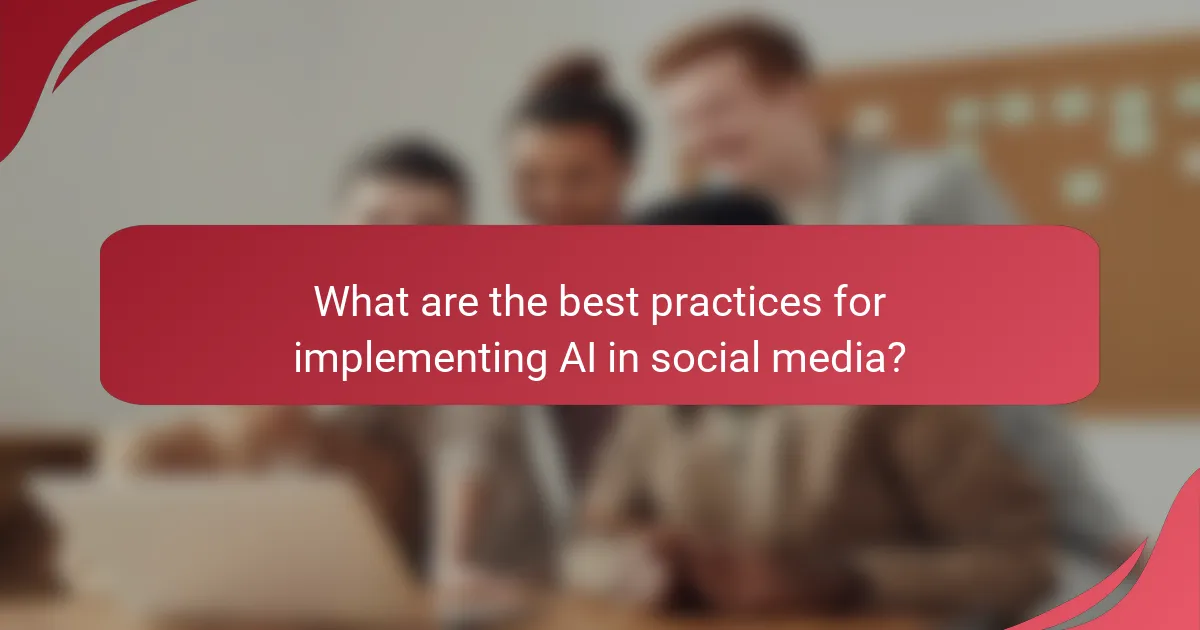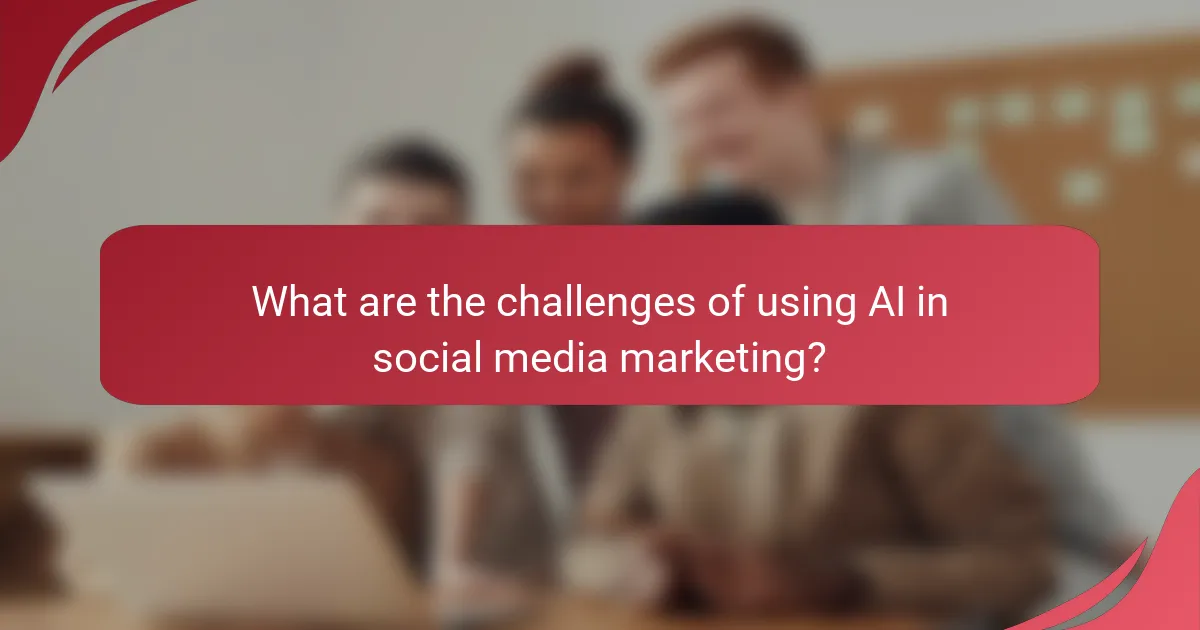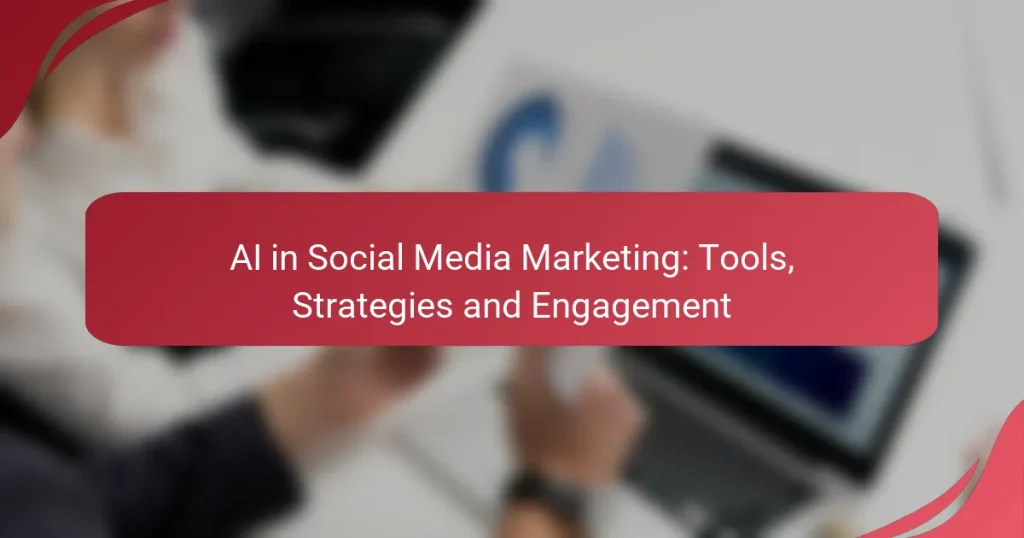Artificial Intelligence is revolutionizing social media marketing by automating processes, refining targeting, and personalizing content to better engage audiences. By utilizing advanced data analytics and machine learning, businesses can not only enhance their marketing strategies but also predict trends that drive user interaction and engagement. Essential AI tools play a crucial role in content creation, audience engagement, and performance analytics, ultimately boosting marketing effectiveness.

How can AI enhance social media marketing strategies?
AI can significantly improve social media marketing strategies by automating processes, enhancing targeting, and personalizing content. By leveraging data analytics and machine learning, businesses can engage their audiences more effectively and predict trends that drive engagement.
Improved audience targeting
AI enhances audience targeting by analyzing user data to identify specific demographics, interests, and behaviors. This allows marketers to create highly tailored campaigns that resonate with their target audience, increasing conversion rates.
For example, AI tools can segment audiences based on their online activity, enabling brands to deliver personalized ads that are more likely to engage users. Utilizing platforms like Facebook Ads or Google Ads, marketers can refine their targeting to reach the most relevant users.
Content personalization
Content personalization through AI involves customizing messages and visuals to match individual user preferences. By analyzing past interactions, AI can suggest content that aligns with users’ interests, enhancing engagement and loyalty.
For instance, brands can use AI to recommend products based on previous purchases or browsing history, creating a more relevant shopping experience. Tools like Dynamic Yield or Optimizely help marketers implement these personalized strategies effectively.
Automated customer engagement
AI-driven chatbots and virtual assistants can automate customer engagement, providing instant responses to inquiries and improving user experience. These tools can handle common questions, freeing up human agents for more complex issues.
Implementing chatbots on platforms like Facebook Messenger or WhatsApp can lead to quicker response times and higher customer satisfaction. Marketers should ensure that these bots are well-trained to handle a variety of queries to avoid frustrating users.
Predictive analytics for trends
Predictive analytics uses AI to forecast social media trends by analyzing historical data and user behavior. This enables marketers to stay ahead of the curve and adjust their strategies proactively.
For example, tools like Google Trends or Sprout Social can help identify emerging topics or shifts in audience preferences. Marketers should regularly review these insights to refine their content strategies and maintain relevance in a fast-paced digital landscape.

What AI tools are essential for social media marketing?
Essential AI tools for social media marketing enhance content creation, audience engagement, and performance analytics. These tools streamline processes, improve targeting, and provide insights that can significantly boost marketing effectiveness.
Hootsuite Insights
Hootsuite Insights leverages AI to analyze social media conversations and trends, providing valuable data on audience sentiment and engagement. This tool helps marketers understand what content resonates with their audience, allowing for more targeted campaigns.
With features like real-time monitoring and customizable reports, Hootsuite Insights enables users to track brand mentions and industry trends effectively. This can lead to timely adjustments in strategy based on audience feedback and emerging topics.
Sprout Social
Sprout Social offers AI-driven analytics that help businesses measure social media performance and engagement. Its features include social listening, which identifies key conversations and trends relevant to a brand’s audience.
Marketers can utilize Sprout Social’s scheduling and publishing tools to optimize posting times based on when their audience is most active. This ensures higher visibility and engagement rates, maximizing the impact of social media efforts.
Buffer
Buffer is an AI-powered social media management tool that simplifies scheduling and publishing content across multiple platforms. It provides insights into the best times to post, enhancing audience reach and engagement.
Users can analyze post performance through Buffer’s analytics features, which help identify successful content types and strategies. This data-driven approach allows marketers to refine their social media tactics continuously.
Canva for AI-generated graphics
Canva utilizes AI to assist users in creating visually appealing graphics for social media. With a vast library of templates and design elements, it enables marketers to produce high-quality visuals quickly.
AI features like Magic Resize and design suggestions streamline the graphic creation process, ensuring that content is optimized for various platforms. This efficiency helps maintain a consistent brand image while saving time and resources.

How to measure AI impact on social media engagement?
Measuring the impact of AI on social media engagement involves analyzing various metrics that reflect user interaction and sentiment. Key areas to focus on include engagement rates, conversion tracking, and sentiment analysis, each providing insights into how AI tools enhance user experience and marketing effectiveness.
Engagement rate metrics
Engagement rate metrics quantify how users interact with content on social media platforms. Commonly calculated as the total interactions (likes, shares, comments) divided by total followers or impressions, these metrics can vary widely by industry, typically ranging from 1% to 5% for most brands.
To effectively measure engagement, consider using AI tools that automate data collection and analysis. These tools can help identify peak engagement times and content types that resonate best with your audience, allowing for more targeted strategies.
Conversion tracking
Conversion tracking assesses how well social media efforts translate into desired actions, such as purchases or sign-ups. By implementing tracking pixels or UTM parameters, marketers can link social media interactions directly to conversions, providing a clearer picture of ROI.
AI can enhance conversion tracking by analyzing user behavior patterns and predicting which segments are most likely to convert. This allows for more personalized marketing strategies, increasing the likelihood of successful conversions.
Sentiment analysis
Sentiment analysis evaluates the emotional tone behind social media interactions, helping brands understand public perception. AI-driven tools can analyze comments and mentions to categorize sentiment as positive, negative, or neutral, offering valuable insights into audience attitudes.
Utilizing sentiment analysis can guide content creation and customer service strategies. For instance, if negative sentiment spikes around a specific product, brands can address concerns proactively, improving overall engagement and customer satisfaction.

What are the best practices for implementing AI in social media?
To effectively implement AI in social media, focus on setting clear goals, integrating AI tools with your existing systems, and regularly analyzing performance metrics. These practices ensure that AI enhances your marketing strategies and drives engagement.
Define clear objectives
Establishing clear objectives is crucial for successful AI implementation in social media. Determine what you want to achieve, such as increasing engagement rates, improving customer service response times, or enhancing content personalization.
Use the SMART criteria—specific, measurable, achievable, relevant, and time-bound—to outline your goals. For example, aim to boost engagement by 20% over the next three months through targeted AI-driven campaigns.
Integrate with existing tools
Seamless integration of AI tools with your current social media management platforms is essential. This ensures that data flows smoothly between systems, allowing for more efficient analysis and execution of campaigns.
Consider using AI tools that are compatible with popular platforms like Hootsuite or Buffer. This can help streamline processes such as content scheduling, audience targeting, and performance tracking.
Regularly analyze performance
Consistent performance analysis is vital to gauge the effectiveness of your AI initiatives in social media. Set up regular intervals—weekly or monthly—to review key performance indicators (KPIs) like engagement rates, click-through rates, and conversion metrics.
Utilize AI analytics tools to gain insights into audience behavior and campaign performance. This data can inform adjustments to your strategy, ensuring that your AI efforts remain aligned with your objectives and continue to drive results.

What are the challenges of using AI in social media marketing?
Using AI in social media marketing presents several challenges, including data privacy concerns, algorithm bias, and the need for human oversight. Marketers must navigate these issues to effectively leverage AI tools while maintaining trust and compliance.
Data Privacy Concerns
Data privacy is a significant challenge when implementing AI in social media marketing. Companies must ensure they comply with regulations like GDPR in Europe or CCPA in California, which dictate how personal data can be collected and used. Failing to adhere to these regulations can result in hefty fines and damage to brand reputation.
Marketers should prioritize transparency with users about how their data is utilized. Implementing clear privacy policies and obtaining consent can help mitigate risks associated with data misuse.
Algorithm Bias
Algorithm bias can lead to skewed marketing outcomes, as AI systems may reflect the biases present in their training data. This can result in targeting errors or exclusion of certain demographics, undermining campaign effectiveness. It’s crucial to regularly audit AI algorithms to identify and correct any biases.
To combat algorithm bias, marketers should diversify their data sources and include a wide range of perspectives in their training datasets. This approach can enhance the fairness and accuracy of AI-driven marketing efforts.
Need for Human Oversight
Despite the capabilities of AI, human oversight remains essential in social media marketing. AI can automate tasks and analyze data, but human judgment is necessary to interpret results and make strategic decisions. Over-reliance on AI can lead to missed nuances in consumer behavior.
Marketers should establish a collaborative framework where AI tools support human creativity and strategy. Regularly reviewing AI-generated insights and outcomes can ensure alignment with brand values and marketing goals.


